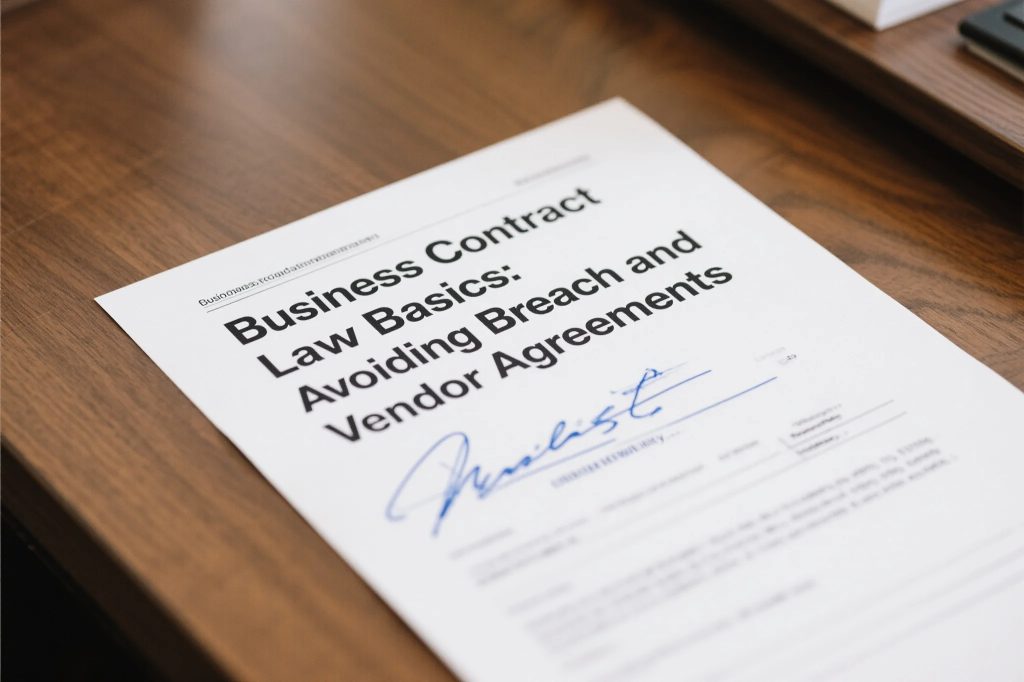The Foundation of Sound Vendor Relationships
Vendor agreements form the backbone of nearly every business operation, yet many companies fail to give these critical documents the attention they deserve. A well-structured contract under business contract law principles serves as both a roadmap for the business relationship and an insurance policy against potential disputes. As supply chain complexities increase and economic volatility continues, the importance of airtight vendor contracts has never been greater. These agreements do more than just outline pricing and deliverables—they establish risk allocation, quality standards, and remedies for when things go wrong.
The most common mistake businesses make is treating vendor contracts as mere formalities rather than strategic tools. In reality, these documents should reflect your company’s risk tolerance, operational requirements, and quality expectations. A thorough legal audit checklist for vendor agreements can reveal hidden liabilities and gaps in protection that might otherwise go unnoticed until a crisis occurs. This proactive approach becomes especially valuable when dealing with overseas suppliers or mission-critical vendors where the stakes are particularly high.
Modern vendor agreements must also account for emerging business realities like cybersecurity risks, climate-related disruptions, and geopolitical uncertainties. The traditional boilerplate language found in many standard contracts often fails to address these contemporary challenges. Companies that tailor their vendor contracts to their specific operational realities and risk profiles gain significant competitive advantages in both day-to-day operations and crisis situations.
Essential Components of Vendor Agreements
The scope of work section represents the heart of any vendor agreement and deserves meticulous attention under business contract law standards. This portion should go beyond vague descriptions of services or products and instead provide measurable, verifiable specifications. Including detailed technical exhibits, service level agreements (SLAs), and quality standards helps prevent misunderstandings that frequently lead to disputes. The most effective scope sections balance sufficient detail with necessary flexibility to accommodate reasonable operational variations.
Pricing structures and payment terms require careful drafting to protect both parties’ financial interests. Beyond simply stating amounts, the agreement should specify adjustment mechanisms for long-term contracts, acceptable payment methods, and clear consequences for late payments. Incorporating these details into your corporate governance policy for vendor management ensures consistency across all organizational contracts. This approach not only reduces legal risks but also streamlines accounts payable processes and strengthens supplier relationships.
Intellectual property provisions often become afterthoughts in vendor agreements but can have enormous financial implications. The contract must clearly delineate ownership of pre-existing IP, work product, and any derivative creations. For businesses that rely heavily on proprietary technology or creative content, these clauses warrant particular attention during legal counsel for businesses review sessions. Ambiguities in IP ownership have led to costly litigation for many companies that failed to address these issues upfront.
Risk Allocation and Liability Management
Limitation of liability clauses serve as critical risk management tools in vendor contracts, but they must be drafted with precision to be enforceable. Courts often scrutinize these provisions carefully, particularly when they attempt to limit liability for gross negligence or intentional misconduct. A balanced approach that recognizes both parties’ legitimate concerns while protecting your company from catastrophic exposure requires sophisticated business contract law expertise. These clauses should be periodically reviewed as your business operations and risk profile evolve.
Insurance requirements represent another essential component of proper risk allocation. The agreement should specify types and minimum amounts of coverage the vendor must maintain, with verification mechanisms and notice requirements for any changes or lapses. Incorporating these requirements into your standard legal audit checklist ensures consistency across all vendor relationships. For high-risk services or products, consider requiring additional insured status and primary/noncontributory wording to maximize your protection.
Indemnification provisions create powerful financial protections when properly structured. The agreement should address third-party claims, intellectual property infringement, employee injuries, and other foreseeable risks. However, overbroad indemnity language can sometimes render provisions unenforceable, making it advisable to have legal counsel for businesses review these clauses for both effectiveness and fairness. The most effective indemnities clearly define the scope of covered claims, notice procedures, and defense obligations.

Performance Standards and Remedies
Clear performance metrics and quality standards transform vague expectations into enforceable contractual obligations. These provisions should establish measurable benchmarks, inspection rights, and acceptance procedures that align with your business needs. Incorporating these standards into your corporate governance policy for vendor management creates organizational consistency while providing clear guidelines for operational teams. Well-drafted performance provisions also make it easier to identify and address issues before they escalate into major problems.
Remedy provisions should outline graduated responses to performance issues, from cure periods for minor deficiencies to immediate termination rights for material breaches. The agreement must specify what constitutes a material breach versus minor deficiencies, along with corresponding remedies. This tiered approach, often developed through legal counsel for businesses, preserves relationships when problems are correctable while protecting your company from prolonged unsatisfactory performance. It also provides clear documentation of good faith efforts should disputes escalate to litigation.
Liquidated damages clauses can provide predictable outcomes for certain types of breaches but require careful drafting to avoid being struck down as penalties. When properly structured, these provisions offer certainty for both parties regarding the financial consequences of delayed performance or other specified failures. The key is ensuring the stipulated amounts bear a reasonable relationship to anticipated actual damages—a determination that often benefits from professional legal and financial analysis.
Term and Termination Considerations
The term section should align with your business planning cycles while maintaining necessary flexibility. Automatic renewal provisions, while convenient, can create unintended long-term obligations if not carefully managed. Your legal audit checklist should include verification of notice periods for non-renewal and any associated penalties. For critical vendor relationships, consider including benchmarking provisions that allow for periodic price or term adjustments based on market conditions.
Termination rights must address both convenience and cause scenarios, with clear procedures for each. The agreement should specify notice requirements, transition obligations, and any post-termination restrictions that apply. From a business contract law perspective, these provisions become particularly important when dealing with vendors who handle sensitive data or proprietary processes. Well-drafted termination sections help ensure business continuity while protecting your company’s legitimate interests when relationships end.
Survival clauses determine which obligations continue after termination, such as confidentiality, indemnification, and outstanding payment terms. These provisions are frequently overlooked during negotiations but can have significant long-term implications. A comprehensive approach aligned with your corporate governance policy ensures consistent treatment of post-termination issues across all vendor relationships, reducing legal risks and administrative burdens.
Dispute Prevention and Resolution Mechanisms
Escalation procedures can resolve many disputes before they require formal intervention. The agreement should outline progressive steps for addressing issues, from operational-level discussions to executive mediation. Incorporating these procedures into your standard contract dispute resolution framework encourages collaborative problem-solving while documenting good faith efforts should litigation become necessary. This approach often preserves valuable business relationships that might otherwise be damaged by adversarial proceedings.
Alternative dispute resolution (ADR) provisions, including mediation and arbitration clauses, can provide faster, less expensive resolution than traditional litigation. However, these clauses require careful drafting to ensure they actually deliver the intended benefits. Factors like venue selection, arbitrator qualifications, and discovery limits significantly impact the ADR process. Legal counsel for businesses can help design ADR mechanisms tailored to your specific needs and risk tolerance.
Governing law and venue selections, while often treated as boilerplate, can have substantial practical consequences. The agreement should specify which jurisdiction’s laws will govern interpretation and where any disputes must be litigated or arbitrated. For businesses operating across multiple states or countries, these choices can significantly impact legal costs and potential outcomes. A well-considered approach aligned with your overall contract dispute resolution strategy provides valuable predictability in an uncertain legal environment.
Special Considerations for Industry-Specific Contracts
Technology service agreements require particular attention to data security, service levels, and intellectual property rights. These contracts should address uptime guarantees, response times for service issues, and data ownership provisions. A thorough legal audit checklist for tech vendors might include cybersecurity requirements, disaster recovery obligations, and source code escrow arrangements. These specialized provisions help protect your business operations and sensitive information when relying on third-party technology providers.
Manufacturing and supply contracts need robust quality control provisions, delivery terms, and supply chain contingency plans. The agreement should specify testing protocols, acceptance criteria, and remedies for defective products. Incorporating these requirements into your corporate governance policy for product quality helps maintain consistent standards across all supplier relationships. In today’s global supply chain environment, these contracts should also address geopolitical risks and alternative sourcing options.
Professional service agreements must carefully define the scope of work, deliverables, and performance standards. These contracts often benefit from detailed statements of work incorporated as exhibits, along with clear provisions regarding personnel qualifications and substitution policies. Business contract law professionals can help craft agreements that protect your interests while maintaining the flexibility often required in knowledge work engagements.
Implementing Effective Contract Management Processes
Centralized contract repositories with standardized metadata tagging transform random documents into valuable business intelligence. This approach, integrated with your corporate governance policy, enables proactive management of renewal dates, compliance obligations, and performance benchmarks. Modern contract lifecycle management systems can automate alerts for key dates and obligations, reducing risks of accidental non-compliance or auto-renewals.
Regular contract audits using a comprehensive legal audit checklist help identify evolving risks and opportunities for improvement. These reviews should assess both individual agreements and portfolio-wide trends, looking for inconsistent terms, unmet obligations, or changing regulatory requirements. The most effective audit processes combine legal analysis with operational and financial perspectives to provide actionable insights.
Training programs for employees involved in vendor management ensure consistent understanding and application of contract terms. These initiatives, developed in consultation with legal counsel for businesses, help operationalize contractual protections while promoting compliance. Well-trained teams can often identify and address potential issues before they escalate into disputes, preserving valuable business relationships while protecting company interests.
When to Engage Legal Professionals
High-value or high-risk vendor relationships warrant early involvement of legal counsel for businesses to structure optimal agreements. Legal professionals can help identify unusual risks, negotiate favorable terms, and ensure proper integration with your existing contractual framework. Their involvement becomes particularly crucial when entering new markets, dealing with innovative technologies, or establishing strategic partnerships.
Complex contract dispute resolution scenarios often benefit from professional guidance to protect your rights while preserving business relationships. Attorneys can help navigate mediation processes, arbitration proceedings, or litigation while keeping sight of both legal and business objectives. Their experience with similar disputes provides valuable perspective on likely outcomes and cost-effective resolution strategies.
Periodic legal reviews of your standard vendor agreements ensure they remain compliant with evolving laws and aligned with business best practices. Changes in data privacy regulations, employment laws, or industry-specific requirements may necessitate updates to your contract templates. A proactive review schedule helps maintain strong legal protections while adapting to changing business environments and risk landscapes.





